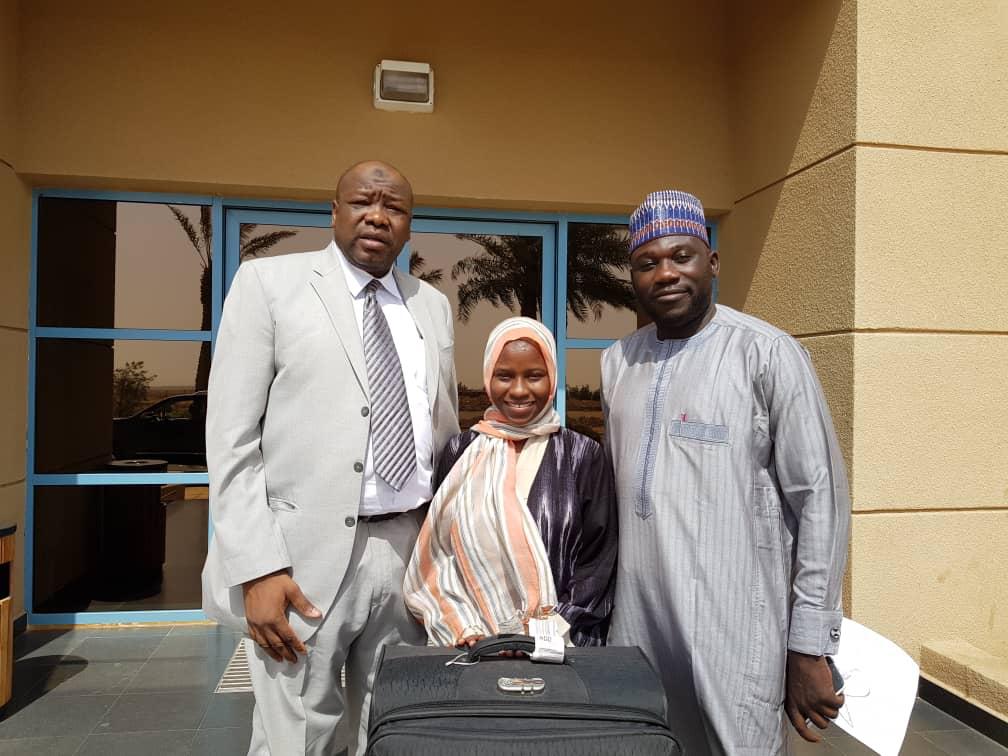
Followings reports that illicit drugs can be planted in passengers’ checked-in luggage without their knowledge and consent, Writer looks at how such obnoxious acts can be prevented at the nation’s airports.
Arrests made late last year by the National Drug Law Enforcement Agency (NDLEA) brought to the fore syndicated operations of drug traffickers who tag drugs on the luggage of travellers.
When the report was initially made public, many Nigerians were sceptical until the suspects arrested by the agency were taken to court and the case, which is still on, let out some revelations.
According to a report from the NDLEA, a cartel which specialised in planting illicit drugs in travellers’ luggage was uncovered by the agency and this was confirmed by the Chairman/ Chief Executive Officer, Col. Mustapha Abdallah (rtd).
The cartel was uncovered after NDLEA detectives embarked on investigation of a Nigerian lady identified as Zainab Aliyu, who was accused of entering Saudi Arabia with Tramadol.
Aliyu, was arrested by Saudi Arabia Police on December 26, 2018, shortly after arriving for Lesser Hajj, over allegations that a luggage, bearing her name tag, contained the unlawful substance.
However, while in detention, the NDLEA received a petition from her father, seeking a probe of his daughter’s ordeal.
Consequently, the NDLEA Commander in charge of Kano airport launched an investigation, which culminated in the arrest and arraignment of seven staff of the airport.
The accused were Idris Umar Shehu, Sanni Suleiman, Nuhu Adamu, Rhoda Adetunji, Udosen Itoro Henry and Sanni Hamisu. The cartel had allegedly planted the tramadol-bearing luggage on Aliyu.
It was further established that Aliyu, who had only a luggage, was not aware that a second bag had been labelled in her name.
The implication of this discovery by NDLEA was that many Nigerians arrested and executed for drug trafficking in Saudi Arabia might be innocent, the agency said.
Release
But by last Tuesday, the federal government had secured the release of Aliyu. This was disclosed by the Permanent Secretary, Ministry of Foreign Affairs, saying that the government has been able to establish the innocence of Zainab and the second Nigerian involved in the case, Ibrahim Abubakar, would be released tomorrow (Wednesday) to the Nigerian Mission in Saudi Arabia.
NDLEA Confirms
NDLEA Commander of Narcotics at the Mallam Aminu Kano International Airport, Kano, Ambrose Umoru confirmed that such syndicate had been thriving for some time at the airport.
In an interview with THISDAY’s sister broad station, Arise TV, Umoru said that as far back as May 2017, the agency received a report that two Nigerians were arrested in Saudi Arabia for alleged possession of Tramadol. Two airline officials and two clearing agents allegedly masterminded the planting of the Tramadol in their luggage.
“When the investigation was conducted, we packaged the report and sent it to our Chief Executive. The report was sent to Saudi Arabia authorities and the two Nigerians were released.
“In the same May, 2017, some officials of airline handling company colluded with a passenger to ferry narcotic drugs ephedrine and used their official pass to take the drug to the tarmac where it was loaded to the airplane.
“We got tip off and seized the drug and arrested the passenger, two officials of airline handing company and two clearing agents. They were charged to court and were convicted and jailed three to four years,” Umoru said.
After this incident, Umoru said NDLEA felt that something was wrong and the agency decided to sensitise the workers of the airport and in November 2017 organised sensitization workshop, targeting handlers, airline officials, security operatives and others, telling them about the dangers of assisting drug couriers.
“On the 26 of December 2018, Zainab Aliu was travelling with her mother and elder sister, each of them carried one luggage and when they came to the checking counter, the handling company officials generated three extra tags in their names and tagged the luggage that did not belong to them.
“Each of them had extra bag attached to her. Incidentally, when they arrived their destination they collected their original bags. But later in the night, the Saudi Arabia police busted into the hotel room of Zainab where she was with her mother. They asked for her and said she had another bag she did not collect.
“Zainab insisted she had only one luggage. Police insisted she had another bag and took her to the airport. When the opened the bag tagged with her name they found 2000 tablets of Tramadol that was concealed inside other items. Police arrested and took her to custody,” Umoru narrated.
According to him, her mother alerted her husband, Zainab’s father who was in Nigeria and who promptly alerted NDLEA and laid a complaint.
“That was how we started the investigation. We had earlier arrested 10 airline handlers and some clearing agents but upon discreet investigation we now found out that six of them were found to be implicated.
“One is a staff of an airline handling company, three were clearing agents, and two others were staff of Security Company. We packaged the report and sent it to our Chief Executive and charged them to court immediately at the High Court in Kano. As we speak now the case is ongoing.
“The federal government was alerted and a letter was written to Saudi authorities indicating the innocence of Zainab who was alleged to have Tramadol found in her bag,”
Umoru also explained and added that at the same time one Ibrahim Abubakar was also implicated and the same 2000 tables of Tramadol was found in a bad associated to him with the tag that bore his name.
Umoru advised travellers to always refuse to help anyone carry his bag; that “passengers coming to Nigeria or going out of Nigeria should not accept the luggage of anyone; except in a case where the bag was packed in your presence.”
Lucrative but Illicit Business
Spokesman of NDLEA, Jona Acheme told THISDAY that there was no doubt that the cartel had been operating for some time before they were caught by the agency and noted that they succeeded in planting drugs on people’s luggage by associating the drugs with the passengers through their name tag obtained after the checked in their luggage.
He said when a traveller has luggage weight below the maximum weight allowed, they could add the extra bag, and using the same tag name of the passenger.
This, he suggested, was being done in connivance with some handling companies’ officials and that of the airlines. When the luggage arrived at its destination, the bag with illicit drug would be collected but it seemed likely that the cartel representative at the final destination in Saudi Arabia did not act very fast in the case of Zainab and the bag was traced to her through the nametag.
Achema said two ways to prevent this are to make sure the weight of the passenger’s luggage is recorded and reflected in the luggage tag given to him and to ensure a more thorough check by the handling company.
He said during rush hour, the handling company would not allow passengers to crowd the check in desk but attend to them by group of 10, for example, so that they would have enough room to scrutinize every bag.
“If the weight of the luggage check-in is recorded and given to the passengers, anything extra is suspect and would not be credited to the passenger.
“It is also likely that the members of the syndicate would be taking advantage of the rush hour, so it becomes the responsibility of the handling company and the airline to control the passenger flow during facilitation in order to have enough time to check every luggage and tag them appropriately.”
Curiosity
There are questions being asked by many Nigerians about the so-called syndicates. Many are wondering how such a group would have representatives in such a very strict country like Saudi Arabia. They are also wondering how the extra bag with illicit drug planted by them are received at the destination and if it has been an on-going obnoxious activity, why have not those people been discovered long before now?
Achema explained to THISDAY that the drug traffickers, who are also ruthless, always have a way of getting what they want until they are caught. He suggested that the bags containing illicit drugs are taken out on arrival before the bags get to the carousel, where the passenger picks his own bags, but when there is hiccup in the illegal process, the innocent passenger is caught with the bag associated to him.
Role of Handling Companies
Managing Director of Skyway Aviation Handling Company Plc (SAHCO), Mr. Basil Agboarumi, in an interview, urged airlines and aviation handling companies to monitor their employees and ensure that they do the right things.
According to him, “Everybody employed in a company knows the rules, but a staff can sabotage the rules for his own benefits. For example, we put our staff that we employ and post to various airports to the same processes and procedures. We profile them and before they will be given On Duty Card (ODC) that allows them to go to the restricted areas of the airport by the Federal Airports Authority of Nigeria (FAAN), they are further scrutinized by the agency,” Agnoarumi said.
He said that workers at the airport, from airline staff, security agencies, handling companies and airport management personnel need to cooperate to fight against crimes at the airports.
“In our company if we suspect you, we investigate you and if you are found wanting we boot you out. You cannot be too sure of anybody, but if we suspect you, we send you out. So I advise that there should be cooperation among the companies and workers at the airport,” he said.

Agnoarumi, noted that whenever there was any criminal activity the process is traced to know where it originated and to know those who could be responsible, adding that because criminals could do anything to succeed in what they want to do, concerned authorities, airlines and handling companies should be proactive to prevent criminals from having their way.
THISDAY






